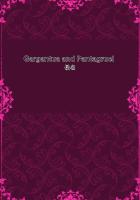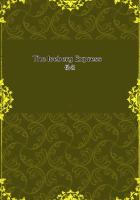The most tiresome of them all is a noisy woman who, as far as I can make out, hasn't any name at all. 'Miss Montgomery' is on her cards, but that is only what she calls herself. Who she really is!
It would shake the foundations of European society if known. We sit and talk about the aristocracy; we don't seem to know anybody else. I tried on one occasion a little sarca** as a corrective--recounted conversations between myself and the Prince of Wales, in which I invariably addressed him as 'Teddy.' It sounds tall, I know, but those people took it in. I was too astonished to undeceive them at the time, the consequence is I am a sort of little god to them. They come round me and ask for more. What am I to do? I am helpless among them. I've never had anything to do before with the really first-prize idiot; the usual type, of course, one knows, but these, if you haven't met them, are inconceivable. I try insulting them; they don't even know I am insulting them. Short of dragging them out of their chairs and kicking them round the room, I don't see how to make them understand it."
"And Mrs. Loveredge?" asked the sympathetic Peter, "is she--"
"Between ourselves," said Joey, sinking his voice to a needless whisper, seeing he and Peter were the sole occupants of the smoking-room--"I couldn't, of course, say it to a younger man--but between ourselves, my wife is a charming woman. You don't know her."
"Doesn't seem much chance of my ever doing so," laughed Peter.
"So graceful, so dignified, so--so queenly," continued the little man, with rising enthusiasm. "She has only one fault--she has no sense of humour."
To Peter, as it has been said, men of forty were mere boys.
"My dear fellow, whatever could have induced you--"
"I know--I know all that," interrupted the mere boy. "Nature arranges it on purpose. Tall and solemn prigs marry little women with turned-up noses. Cheerful little fellows like myself--we marry serious, stately women. If it were otherwise, the human race would be split up into species."
"Of course, if you were actuated by a sense of public duty--"
"Don't be a fool, Peter Hope," returned the little man. "I'm in love with my wife just as she is, and always shall be. I know the woman with a sense of humour, and of the two I prefer the one without. The Juno type is my ideal. I must take the rough with the smooth. One can't have a jolly, chirpy Juno, and wouldn't care for her if one could."
"Then are you going to give up all your old friends?"
"Don't suggest it," pleaded the little man. "You don't know how miserable it makes me--the mere idea. Tell them to be patient.
The secret of dealing with women, I have found, is to do nothing rashly." The clock struck five. "I must go now," said Joey.
"Don't misjudge her, Peter, and don't let the others. She's a dear girl. You'll like her, all of you, when you know her. A dear girl! She only has that one fault."
Joey went out.
Peter did his best that evening to explain the true position of affairs without imputing snobbery to Mrs. Loveredge. It was a difficult task, and Peter cannot be said to have accomplished it successfully. Anger and indignation against Joey gave place to pity. The members of the Autolycus Club also experienced a little irritation on their own account.
"What does the woman take us for?" demanded Somerville the Briefless. "Doesn't she know that we lunch with real actors and actresses, that once a year we are invited to dine at the Mansion House?"
"Has she never heard of the aristocracy of genius?" demanded Alexander the Poet.
"The explanation may be that possibly she has seen it," feared the Wee Laddie.
"One of us ought to waylay the woman," argued the Babe--"insist upon her talking to him for ten minutes. I've half a mind to do it myself."
Jack Herring said nothing--seemed thoughtful.
The next morning Jack Herring, still thoughtful, called at the editorial offices of Good Humour, in Crane Court, and borrowed Miss Ramsbotham's Debrett. Three days later Jack Herring informed the Club casually that he had dined the night before with Mr. and Mrs.
Loveredge. The Club gave Jack Herring politely to understand that they regarded him as a liar, and proceeded to demand particulars.
"If I wasn't there," explained Jack Herring, with unanswerable logic, "how can I tell you anything about it?"
This annoyed the Club, whose curiosity had been whetted. Three members, acting in the interests of the whole, solemnly undertook to believe whatever he might tell them. But Jack Herring's feelings had been wounded.
"When gentlemen cast a doubt upon another gentleman's veracity--"
"We didn't cast a doubt," explained Somerville the Briefless. "We merely said that we personally did not believe you. We didn't say we couldn't believe you; it is a case for individual effort. If you give us particulars bearing the impress of reality, supported by details that do not unduly contradict each other, we are prepared to put aside our natural suspicions and face the possibility of your statement being correct."
"It was foolish of me," said Jack Herring. "I thought perhaps it would amuse you to hear what sort of a woman Mrs. Loveredge was like--some description of Mrs. Loveredge's uncle. Miss Montgomery, friend of Mrs. Loveredge, is certainly one of the most remarkable women I have ever met. Of course, that isn't her real name. But, as I have said, it was foolish of me. These people--you will never meet them, you will never see them; of what interest can they be to you?"
"They had forgotten to draw down the blinds, and he climbed up a lamp-post and looked through the window," was the solution of the problem put forward by the Wee Laddie.
"I'm dining there again on Saturday," volunteered Jack Herring.
"If any of you will promise not to make a disturbance, you can hang about on the Park side, underneath the shadow of the fence, and watch me go in. My hansom will draw up at the door within a few minutes of eight."
The Babe and the Poet agreed to undertake the test.















